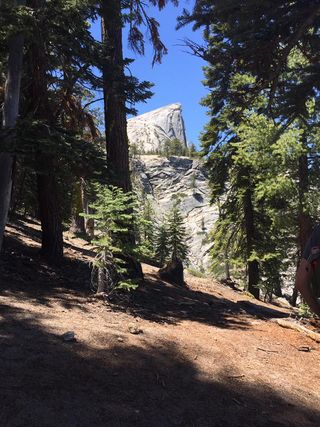Health
The Therapeutic Value of Nature
Beyond valuable exercise, hiking is a meditative, health-enhancing respite.
Posted August 26, 2016

"I only went out for a walk, and finally concluded to stay out till sundown, for going out, I found, was really going in." ~ John Muir
To say that life in 2016 is challenging is, for a great many people, an understatement. Trying to maintain the rapid pace required to balance a wide array of responsibilities—job/school/career, relationship/marriage, finances, home, kids, other family obligations, health, etc.—can feel like a continuous race in which we’re always struggling to keep up. We get caught up in dancing as fast as we can in our efforts to cover as many bases as possible while we are pulled in more different directions. It’s all too easy to lose conscious contact with the present moment and in turn, from the experience of feeling psychologically centered and spiritually anchored. In such stress-inducing circumstances, conscious self-care becomes increasingly critical. This is especially true for anyone in recovery from addiction.
An essential component of this self-care can take the form of spending time in nature. Natural environments—green spaces, lakes or oceans, the mountains, and the forest—tend to have a present-centering effect that brings our attention to the here and now. It precipitates a shift from the sympathetic division of the central nervous system (that engages in response to stress) to the parasympathetic division. This activates the body’s relaxation response, wherein breathing slows down and deepens, internal dialogue becomes less incessant, and worries are less pressing.
The therapeutic value of such experiences is not to be underestimated. Research suggests that contact with nature can be extremely beneficial, leading to improvements in mood, cognition, and health. According to this meta-analysis, being connected to nature and feeling happy are indeed connected.
Wilderness areas, in particular, are portals to present-centeredness, transporting us to an attuned awareness of the here and now, capturing our conscious attention, and anchoring us in the moment. Spending five days hiking in Yosemite National Park earlier this summer reinforced my appreciation for documentary film maker Ken Burns’ description of our national parks as “America’s best idea.” In her book The Hour of Land, which explores the spiritual dimension of our national parks, Terry Tempest Williams wrote that they are “breathing spaces for a society that increasingly holds its breath.”
The Japanese have a specific term for the generally calming and health-enhancing benefits of nature: Shinrin-yoku which translates to "forest bathing." Shinrin-yoku can be defined as making contact with and taking in the atmosphere of the forest.
Many people have felt stress and tension recede amidst the majesty of a veritable cathedral of big trees, but the therapeutic effects of forest bathing are far from just anecdotal. Results from research conducted in Japan confirms that time spent in forest environments promotes lower concentrations of the stress hormone cortisol, lower pulse rate, lower blood pressure, greater parasympathetic nerve activity, and lower sympathetic nerve activity.
In addition to producing meaningful increases in calmness and contentment, research also demonstrates that hiking in nature can significantly reduce rumination related to negative, obsessive thoughts. Many people, but particularly those in the earlier stages of addiction recovery, find themselves consumed by wave after wave of distressing thoughts. Often, these relate to events that occurred in the past and involve regrets or resentments, and/or concerns about what might or could potentially happen at some point in the future—later today, tomorrow, next week, in three months, or next year. Like an annoying song stuck on replay such thoughts take us away from the present moment and whatever enjoyment or importance it may contain.
Hiking, notably in wilderness environments, becomes a walking meditation that peels away distractions to gently yet firmly hold our attention and bring us to present-centeredness in the moment—this moment—creating the space that lets us see both the forest and its trees. When we connect with nature, we re-connect—both consciously and unconsciously—with the most original and authentic parts of ourselves, and expand our capacity to connect with others and the world through an enriched awareness of the commonalities that link us all together, as well as a greater sense of our place as part of a much greater whole.
The respite that being in nature provides from the haunting prisons of the past and the persistent pulls of the future, along with the sense of connection with that outside of and beyond oneself is a powerful antidote for the stresses and strains of 21st century life on its own terms. It is wonderful medicine, best taken regularly.
Copyright 2016 Dan Mager, MSW
Author of Some Assembly Required: A Balanced Approach to Recovery from Addiction and Chronic Pain


